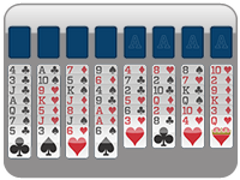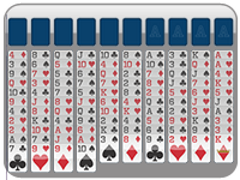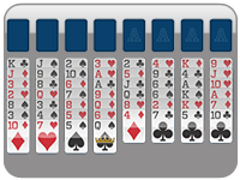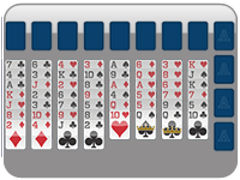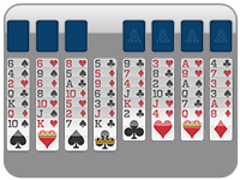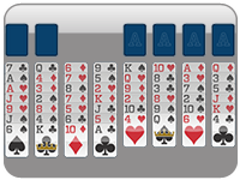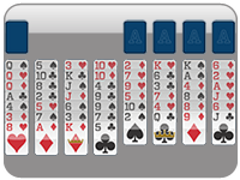Mastering Solitaire Strategy: Tips for Winning Every Game
Whether you first discovered it as a game on your computer or were introduced to the game by someone else, solitaire has always had a kind of quiet charm to it. It's the type of game that you can play to unwind, focus, or challenge your patience when you need a mental break. What makes it even more appealing today is how easy it is to play online with no deck of cards required. It's just you, your screen, and the next move waiting to be made.
But if you've ever found yourself one move away from finishing and suddenly stuck, you know solitaire is a game about more than just luck. It's a game of logic, timing, and observation. And with the right strategy, you can turn it from something casual into a skillful game. So let's start by refining your overall approach before diving into some of the advanced techniques that make games like Freecell such a rewarding challenge.

Perfect Your Solitaire Strategy
Understanding the rules and goals
Before getting too deep into the strategy of solitaire, it helps to revisit what solitaire is really about. The goal is simple: build up the foundation piles by suit from Ace to King. To get there, you'll be moving cards between columns, revealing face-down cards, and using the stock pile when you're out of options.
That might sound straightforward, but every move has long-term consequences. Knowing how the rules work and why certain moves open more opportunities than others is the difference between just playing and playing with the intent to win. Once you understand that, the game becomes less about reacting and more about planning ahead.
How to plan ahead like a pro
This is where good solitaire players set themselves apart. It's tempting to move a card just because you can, but the best players who win consistently will always think two or three moves ahead. Before shifting anything, ask yourself what it unlocks. Will it free up a face-down card? Will it open a space for a King? If not, then maybe hold off for now.
The smartest move is often the one that creates more flexibility later. Try to keep at least one empty column whenever possible as it's your most powerful tool for rearranging cards. Use it strategically to clear pathways or to temporarily hold a card while you build sequences elsewhere. The key is to create options and not just act on impulse.
If you're playing online, you'll usually have an undo button. Use it not to cheat, but to explore different options. Seeing how one small change alters the outcome helps you build a stronger sense of what works best over time.
Managing tableau and stock effectively
Balancing your moves between the tableau (the main play area) and the stock pile takes practice. A lot of players flip through the stock too quickly, wasting cards that could have been useful later. Instead, work as much as you can within the tableau first. Every card you reveal there gives you more control over the game.
When you do draw from the stock, think carefully before placing anything right away. Sometimes it's smarter to hold back and see if that card fits into your long-term plan. In online solitaire, it's easy to rush because everything moves so fast and you don't have to manually deal cards out, but slowing down often leads to more wins because it gives you time to think.
Avoiding common beginner mistakes
Even experienced players can fall into bad habits. One of the most common mistakes is sending cards to the foundation piles too early. It feels productive since it's ultimately the goal of the game, but it can actually block key moves later on. Keep cards in play until you're sure they're no longer needed in the tableau.
Another habit to watch is moving Kings without a clear plan. An empty column is powerful, but only if you fill it wisely. Avoid rushing to fill open spaces with the first King you see and instead, wait for one that supports your sequences. Solitaire is a game that rewards patience, and that's often what separates a good game from a great one.
Advanced Freecell Techniques
What makes Freecell different?
If classic solitaire is about patience and careful reveals, Freecell is about strategy and forward thinking. Every card is visible from the start, which means luck plays a much smaller role. Your success depends almost entirely on proper planning and sequencing.
Because there's no hidden information, Freecell tends to reward logic and precision. Each move affects several future possibilities, and the challenge comes from managing those open cells and empty columns efficiently.
Mastering open cells and empty columns
The open cells in Freecell will be key to your strategies. They act as temporary holding spaces, letting you shift cards around to reach what you need. But the real secret is learning when to not use them as well. Each occupied cell limits your ability to move cards around, reducing the number of cards you can move in a sequence.
For example, if you have one open cell, you can move a single card. With two, you can move three (one per cell plus one extra). With all four cells free, you can move a sequence of up to five cards. The math adds up fast, and it shows why keeping at least one or two cells open is critical for flexibility.
The same logic applies to empty tableau columns. Each open column doubles your movement potential. Skilled players will deliberately create empty spaces early so they can maneuver longer runs of cards later in the game. Think of each open area as extra breathing room for your strategy that lets you turn a blocked position into a winning one.
Sequencing and building tactics
In Freecell, sequencing is key to setting up future plays. Try not to build long runs too early, especially if they trap lower cards you'll need later. Always keep an eye on your lowest available cards for each suit, as those are the ones you'll eventually build up to the foundations.
Good players will treat every move as part of a chain. When you move a red 8 onto a black 9, consider what that opens up and what it closes off. Sometimes the best move is one that looks small but unlocks access to a key card. It's like solving a puzzle backward because you're always working toward a clear board, even if the path there feels indirect.
Common Freecell endgame strategies
As you get closer to finishing, try to resist the urge to rush your final moves. The endgame in Freecell can collapse quickly if you overlook one blocked sequence. Focus on keeping your foundation piles balanced so that you're not stuck waiting for one suit to catch up with the others.
Try to maintain open cells right until the end, using them to free key cards that complete your sequences. Many players tend to lose near the finish line because they fill every space too soon. Keep flexibility until the very last move because in Freecell, controlling the board is everything.
Top Solitaire Variants to Try
Once you've gotten comfortable with the standard versions of solitaire, it's worth exploring a few other types. Each one plays by slightly different rules, and those differences can change how you think and strategize. Trying new variants keeps the game fresh, and it helps you develop a more flexible mindset when you switch back to your usual favorite.
There's also a hidden benefit: every variant strengthens different parts of your logical thinking. Some versions reward quick pattern recognition, while others test patience or long-term planning. The more you play, the sharper your overall strategy becomes which makes you better at every kind of solitaire, from the classic layouts to the trickier challenges.
With so many versions available to play online, it's easier than ever to find one that fits your style. So here are a few of the most popular ones worth trying and what makes each unique.
Spider Solitaire is probably the most challenging of the bunch, especially in its two-deck format. Instead of building by alternating colors, you build sequences of the same suit, which adds an entirely new layer of difficulty. The trick is to focus on completing full runs (King to Ace) whenever possible. Many players find it helpful to start with the one-suit version to get familiar with the flow, then move up to two or four suits for a real mental workout.
Pyramid Solitaire brings math and matching into play. Instead of building suits or colors, you remove pairs of cards that add up to 13. It's a faster-paced game but still requires careful planning. You'll need to decide which pairs to remove early so you don't trap lower cards underneath. Pyramid is perfect for players who like a balance of luck, logic, and light strategy in their solitaire sessions.
Then there's TriPeaks Solitaire, one of the most popular online versions because it's quick and intuitive. You clear cards that are one rank higher or lower than the card showing, which makes it feel more fluid than traditional solitaire. The key here is keeping streaks going as each consecutive move adds points and momentum. It's also a great version to play when you don't have much time but still want a satisfying challenge.
Each of these games tests a slightly different skill. Spider teaches patience and focus, Pyramid rewards good judgment, and TriPeaks pushes you to think fast. Even if you primarily play Freecell or the classic Klondike version, mixing in other styles will improve how you analyze moves and adapt your strategies.
Freecell Tips for Beginners
Start with patience and observation
If you're new to Freecell, the best advice anyone can give you is to slow down and take your time. Because every card is visible from the start, this version of solitaire rewards those who take a moment to study the layout before making their first move.
Think of the opening tableau as a puzzle waiting to be solved. Instead of rushing into your first move, plan two or three steps ahead. Try to identify which cards you'll need to move first to create open columns and how you can use your free cells without boxing yourself in. This kind of early planning sets up the rest of the game for success.
In Freecell, there's no penalty for taking your time. Unlike timed online versions of solitaire that push you to move quickly, Freecell rewards patience. The more thoughtful your approach, the easier it'll be to see those winning paths open up later in the game.
Use the free cells wisely
Remember that It's called Freecell for a reason! Those open cells are your secret weapon compared to other forms of solitaire. They let you temporarily move cards out of the way to access something buried deeper in the tableau. But just because they're there doesn't mean you should fill them right away. In fact, one of the golden rules of Freecell is to never fill all your free cells at once.
When playing online, it's easy to get into the habit of using every available cell because you can move cards quickly with a click. Try resisting that urge. Keep at least one or two cells open as often as possible, and use them deliberately. That bit of restraint is often what separates beginners from more experienced Freecell players who seem to win effortlessly.
Practice daily to spot patterns
Like most strategy games, Freecell rewards practice. The more you play, the more you'll start recognizing recurring layouts, move sequences, and problem-solving patterns. You'll begin to notice situations that used to feel complicated and realize you already know the best way through them.
Most importantly, don't get discouraged by a tough game. Some deals are more complex than others, but every loss teaches you something about how to plan, sequence, and manage your free cells more effectively. Keep practicing, stay curious, and you'll notice your win rate steadily climb.
Solitaire and Freecell both reward patience, foresight, and a willingness to think several moves ahead. Once you understand how each version works and how to balance short-term plays with long-term goals, the game starts to feel less like luck and more like strategy. Keep experimenting with different solitaire variants, practice regularly, and stay calm when the layout looks impossible. Over time, you'll start winning more often not because you got lucky, but because you learned how to read the game!
Freecell Games
More Solitaire Games
More Games
247 Freecell News
Disclaimer
DISCLAIMER: The games on this website are using PLAY (fake) money. No payouts will be awarded, there are no "winnings", as all games represented by 247 Games LLC are free to play. Play strictly for fun.

